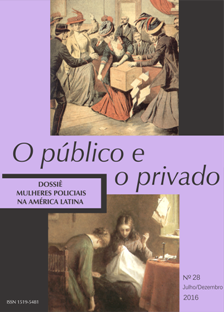The police do not have a woman’s face
invisibility and fight for recognition
Keywords:
Women, police institutions, work conditions, gender relations, recognitionAbstract
This paper proposes a reflection about women’s conditions in the Brazilian police in the contemporary context, starting from the dialogue between two researches about the theme: the research “The condition of women in the Brazilian police”, conducted by UFRGS’s Violence and Citizenship Research Group, and the research Public Security Policies, police work and conflicts, linked to the Casadinho project between UECE (Human Rights, Citizenship and Ethics Lab) and UFRGS. Articulating the results from both studies, the first qualitative and the second which sought to draw a qualiquantitative profile of the policemen/women in Ceará and Rio Grande do Sul, it was possible to identify that even thirty years after the women’s entrance in the police institutions, invisibilization processes and the lack of institutional recognition of these professionals in the police institutions still persist. The
contemporary analysis of the presence of women in the police institutions reveals the tensions and contradictions of an insertion process, which is not
consolidated and needs to be reinforced and (re)updated constantly by women through behaviors, practices and strategies that could guarantee support and social and institutional recognition.











